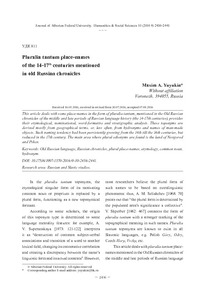Pluralia tantum place-names of the 14-17th centuries mentioned in old Russian chronicles
Скачать файл:
URI (для ссылок/цитирований):
https://elib.sfu-kras.ru/handle/2311/26374Автор:
Yuyukin, Maxim A.
Ююкин, М.А.
Дата:
2016-10Журнал:
Журнал Сибирского федерального университета. Гуманитарные науки. Journal of Siberian Federal University. Humanities & Social Sciences;2016 9 (10)Аннотация:
This article deals with some place-names in the form of pluralia tantum, mentioned in the Old Russian chronicles of the middle and late periods of Russian language history (the 14-17th centuries), provides their etymological, nominational, word-formative and stratigraphic analysis. These toponyms are derived mostly from geographical terms, or, less often, from hydronyms and names of man-made objects. Such naming tendency had been persistently growing from the 14th till the 16th centuries, but reduced in the 17th century. The main area where plural oikonyms are found is the land of Novgorod and Pskov В статье рассматриваются ойконимы в форме pluralia tantum, упомянутые в русских летописях в период с XIV по XVII вв. включительно. Проводится их этимологический анализ, дается характеристика с точки зрения закономерностей номинации, словообразовательной структуры и стратиграфии. Ойконимы образуются преимущественно от географических терминов, а также от гидронимов и наименований рукотворных объектов. Активность этого типа неуклонно возрастала до XVII в., когда произошел ее резкий спад. Преобладающий ареал плюральных названий – Новгородско-Псковская земля
Коллекции:
Метаданные:
Показать полную информациюСвязанные материалы
Показаны похожие ресурсы по названию, автору или тематике.
-
The Chinese-Russian Slang as a Contemporary Aspect of the Russian-Chinese Language Contact
Sokolovskaya, Olga V.; Соколовская, О.В. (Сибирский федеральный университет. Siberian Federal University, 2015-12)This paper sheds some light upon the Chinese-Russian slang as a modern aspect of the Russian- Chinese language contact. The paper shows that there are two main types of the attitude towards the Chinese-Russian slang. The ... -
The Semantics of Russian Life at the Lessons of Russian as a Foreign Language: Linguistic and Methodological Aspects (a Case Study)
Tarasenko, Tatiana V.; Тарасенко, Т.В. (Сибирский федеральный университет. Siberian Federal University., 2015-01)This article is dedicated to the semantics of Russian life through the situation of alcohol drinking, and analysis of the linguistic aspect of the situation of alcohol drinking, the technique of studying the situation ... -
The Mindset of Russian Poetry and Its Rebellion against Russian History
Karlova, Olga A.; Карлова, О.А. (Сибирский федеральный университет. Siberian Federal University., 2016-02)The paper is focused on studying self-consciousness of Russian poetry and its specific relations to Russian history. The theme choice is determined by celebrating the Year of Literature in Russia and a whole series of ... -
The Mystery of the “Finest Hour” of Russian Theatre (Theatre Art as a Way of Constructing Russian Cultural Identity)
Gavrilova, Liudmila V.; Karlova, Olga A.; Гаврилова, Л.В.; Карлова, О.А. (Сибирский федеральный университет. Siberian Federal University, 2018-08)The article presents the results of theatre art research in the context of constructing Russian cultural identity. Theatre art is considered in historical dynamics; the research analyses the main milestones in the development ... -
The Use of the Decisions of the European Court of Human Rights, the Constitutional Court of the Russian Federation when Investigating the Problems of the Criminal Law of the Russian Federation (Article One)
Plohova, Valentina I.; Плохова, В.И. (Сибирский федеральный университет. Siberian Federal University, 2017-07)The article presents the factors dictating the further investigation of the algorithm for assessing the validity of criminal law. It is necessary to check the validity of criminal policy, criminal law drafts, to train ...

